IJCRR - 10(6), March, 2018
Pages: 26-30
Date of Publication: 28-Mar-2018
Print Article
Download XML Download PDF
A Study of Academic Anxiety in Relation to Mental Health in Adolescents
Author: Munni Kumari
Category: Healthcare
Abstract:The present study was a preliminary attempt towards the study of Academic Anxiety in relation to Mental Health of Adolescent students of District Faridabad. For the present venture, Descriptive Survey was conducted on a sample of 100 Senior Secondary
school students. The value of the sample was assessed using standardized tests namely Educational Anxiety Inventory by Dr. Vishal Sood & Dr. Arti Anand and Mental Health Battery by Arun Kumar Singh & Alpana Sen Gupta. The objective of the study was to find out the relationship between Academic Anxiety and Mental Health of Adolescents students. The obtained data were quantitatively analyzed by using descriptive and inferential statistics. The findings revealed that there is significant relationship between Academic Anxiety and Mental Health of Adolescent Boys and Girls of secondary schools at 0.01 and 0.05 levels of significance and they are negatively correlated.
Keywords: Academic Achievement, Mental Health and Adolescents
DOI: 10.7324/IJCRR.2018.1066
Full Text:
INTRODUCTION
Present age is the age of competition. Scientific and technological advancement all over the globe has been made man very conscious and sensitive about his studies, vocation, life style, relations etc. This immense progress has given rise to certain problems. One of the major problems of today's world is “Anxiety”. Every person has a unique nature as regard to capabilities, attitude, personality characteristics and interests. The adolescents have a major impact of anxiety due to bloodshed competition in every field. The parents and teachers are eager to know the various factors, which enhance the anxiety among the students. Academic achievement expectations have created so much fear among the students hat they are not able to utilize their basic potential. They are to only concentrate on their academic performance. Every child is not able to get first division as the level of mental health is not same in every child. Academic anxiety is a common issue that students cannot ignore if they want to succeed in school.
Academic anxiety is a kind of anxiety which relates to the imminent danger from the environment of the educational institutions together with teacher and certain subjects like Chemistry, Physics for numerical, Mathematics, and English to some extent for some north Indian states. It is a mental sensitivity of uneasiness or distress in response to school or college circumstances that is perceived negatively. Academic anxiety is totally not a bad thing. However it is true that a high level of anxiety interferes with concentration and memory which are critical for day to day academic performance and success, however it is also true without any anxiety, majority of us would lack the enthusiasm and motivation to study for exams, do everyday homework or write any research papers.
Mental Health means health of mind. It means harmonious functioning of the whole personality and measure of a person's ability to shape his environment and to adjust to life with a reasonable amount of success efficiency and happiness. Mentally healthy persons are generally good workers, good friends and good citizens. A healthy mind maintains an even temper, an alert intelligence, socially considerable behavior and a happy disposition. The word MENTAL usually implies something more than pure cerebral functioning of a person. It also stands of his emotional effective starts, the relationship he establishes in his socio-cultural context. Similarly, HEALTH refers to more than physical health. Many people, when they hear of the term mental health think of absence of mental illness. When we speak of happiness, peace of mind and enjoyment of satisfaction, we are usually talking about mental health. It has to do with everybody's everyday life. It means overall ways in which people gets along with their peers in their community.
SIGNIFICANCE OF THE STUDY
21ST century can be indicated as the century of competition. Everywhere there is a race, a competition. With the huge development in science and technology, all part of the world is connected with this competition. Especially in the field of education, this competition rapidly increased among the students. Curriculum and co-curricular offerings have tremendously expanded, gripping the students in the adjustment problems. Feeling the insecurity, conflicts within themselves, bad company and low achievement creates emotional tensions and anxiety among the students. They are unable to face the changing trends in the society, the students are taking to drug addiction and even the suicidal note is increasing. To survive in this competitive and complicated world, Good Mental Health is required to all to cope up with all such adjustment problems and anxious atmosphere but school students have been found to have high prevalence of mental health problems.
In recent years, issues related to mental health are often propaganda in mass media not only in a country and even around the world. Mental health is a way of thinking, feeling and behaviour in a person's daily lives. A Person with a healthy mental health can recognize himself on the ability, willing to accept failure, able to control his/her emotions and appreciate him / her . Mental health may deteriorate and its negative effects will affect the daily lives without treatment. Poor mental health leads to stress, anxiety and poor performance in the scholastic skills.
Different studies of Academic Anxiety and Mental Stress have been conducted like Agashe (1991) [2] , Mohanty (1992) [9] , Ojha and Rani, (2004) [10] , Dholakiya and Jansari (2005) [5] , Sanwal, Dube, and Bhatnagar (2006) [6] , Agarwal and Sarna, (2009) [1] , Gupta and Kumar, (2010) [7] , Kumari, N. (2013) [8] , Das, Halder and Mishra(2014) [4] , Bartwal, R.S. (2014) [3] , Deb, Strodl and Sun (2015) [13] , Sharma and Sarin (2016) [12] and Sharma and Pandey (2017) [11] with different variables like Academic Achievement, Academic Stress, Spiritual Intelligence, Emotional Intelligence, Parental Rearing Styles, Parental Support, Self Esteem and Self Confidence etc. showing different results. But there is a dearth need of a study which sees the effect of Academic Anxiety and Mental Health together. Moreover, there are a few number studies have been conducted in the field of Mental Health. Mental Health is a deliberating factor which impact on students' Academic Anxiety. These factors necessitate a moral formal, systematic and intensive process of carrying on the methods of analysis. A systematic structure of investigation must be involved to improve the performance of students in different shapes to introduce an atmosphere conductive to intellectuals and to minimize the anxiety of students because a manageable level of Academic Anxiety is actually a good thing. Moderate Academic Anxiety provides the motivation students require to exert effort completing assigned schoolwork and preparing to take examinations. Academic Anxiety only becomes a problem that needs a solution when the amount experienced grows so excessive that a student is no longer able to function. There was a need of empirical study in this field. It was in this context that present venture was planned and executed. Present study is a humble effort to answer the query i.e. why students feel anxiety and is this academic anxiety is related to their mental health?
OBJECTIVES OF THE STUDY
The Present research was conducted keeping in mind the following objectives:
- To study the difference between the mean scores of Academic Anxiety of Adolescent Boys and Girls.
- To study the difference between the mean scores of Mental Health of Adolescent Boys and Girls.
- To study the relationship between Academic anxiety and Mental Health of adolescent.
HYPOTHESES OF THE STUDY
The researcher will be used Null Hypotheses to remain unbiased. The following Hypotheses will be framed for the present study:
H1:- There will be no significant difference between the mean scores of Academic Anxiety of adolescent boys and girls.
H2:- There will be no significant difference between the mean scores of Mental Health of adolescent boys and girls.
H3:- There will be no significant relationship between Academic Anxiety and Mental Health of adolescents.
SAMPLE
The random sampling (students were chosen in such a way that each has an equal and independent chance of being selected) was used to carry out this research work. The figure that shows the distribution of sample has given below:
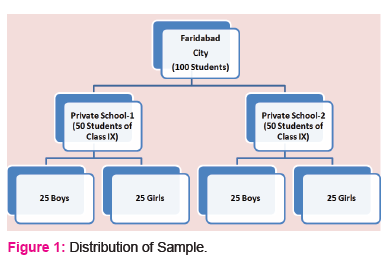
The sample was taken from two Private Schools namely S. D. Public Sr. Sec. School and Anupam Public School affiliated to Board of School Education (BSEH), from city Faridabad (Haryana). A random selection of 100 adolescent students, 50 adolescents' students from each school, of age group 13-16 years of Class IX were selected for the present study. From these 100 students, 50 students were Adolescent Boys and 50 students were Adolescents Girls.
METHODOLOGY
Keeping in mind the nature of the present research, the researcher has been used Descriptive Survey Method to conduct this study.
TOOLS and TECHNIQUES
Various devices are used for collecting new unknown data required for the study of any problem for each and every type of research. The following two tools will be used by investigator to conduct this study. They are:
- Educational Anxiety Inventory of Dr. Vishal Sood and Dr. Arti Anand.
- Mental Health Battery of Arun Kumar Singh and Alpana Sen Gupta.
STATISTICS USED FOR THE PRESENT STUDY
- For the present study Mean was calculated for average Academic Anxiety and Mental Health.
- Standard Deviation ( S.D.) was calculated to find out variability of Academic Anxiety and Mental Health.
- t-value was calculated to study the comparison of Academic Anxiety on Adolescent Boys and Girls
- t-value was calculated to study the comparison of Mental Health on Adolescent Boys and Girls.
- Pearson's Product Moment coefficient of correlation was calculated to estimate the relationship of Academic Anxiety and Mental Health.
ANALYSIS AND INTERPRETATION
In the present chapter analysis and interpretation has been presented in the following manner:
- Objective No 1: To study the difference between the mean scores of Academic Anxiety of Adolescent Boys and Girls.

It can be observed from the table 1 that the mean score of Boys and Girls on Academic Anxiety are found to be 120.02 and 135.38 with Standard Deviation (S.D.) 12.48 and 10.64 respectively. The t-value between the two genders comes out to be 2.08 which is greater than tabled value. It indicates that Boys and Girls differ significantly at 0.05 level. Therefore null hypothesis “There will be no significant difference between the mean scores of Academic Anxiety of Adolescent Boys and Girls” is rejected.
Further the comparison of mean scores reveals that the mean score of Girls are higher than that of Boys scores. Hence, it means that the Adolescents Girls show greater Academic Anxiety than Adolescents Boys. The result is supported by Kumari, Neelam (2013) and Das, Halder and Mishra(2014) [8, 4].
In order to see the mean and standard deviation scores of Adolescent Boys and Girls and t-value at a glance these results have been given in figure :2.
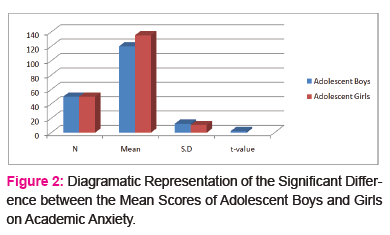
- Objective No 2: To study the difference between the mean scores of Mental Health of Adolescent Boys and Girls.
Figure: 2 shows the mean scores of adolescent boys and girls on Academic Anxiety. And it can be interpreted that Girls have shown higher Academic Anxiety in comparison to Boys.
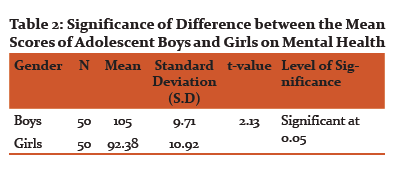
It can be observed from the table 2 that the mean score of Boys and Girls on Mental Health are found to be 105 and 92.38 with Standard Deviation ( S.D.) 9.71 and 10.92 respectively. The t-value between the two genders comes out to be 2.13 which is greater than tabled value. It indicates that Boys and Girls differ significantly at 0.05 level. Therefore null hypothesis “There will be no significant difference between the mean scores of Mental Health of Adolescent Boys and Girls” is rejected.
Further the comparison of mean scores reveals that the mean score of Boys are higher than that of Girls scores. Hence, it means that the Adolescents Girls show better Mental Health than Adolescents Boys. The result is also supported by Agarwal and Sarna (2009) and Gupta and Kumar (2010) [1, 7].
In order to see the mean and standard deviation scores of Adolescent Boys and Girls and t-value at a glance these results have been given in figure:3.
- Objective No 3: To study the relationship between Academic Anxiety and Mental Health of Adolescents Boys and Girls
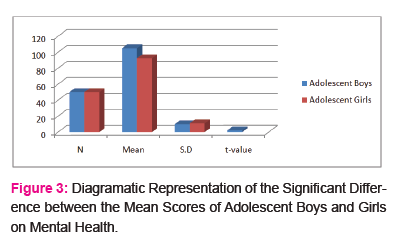

It could be observed from table 3 that obtained coefficient of Pearson's Product Moment Correlation of Academic Anxiety and Mental Health of Adolescent Boys and Girls is 0.19 which is greater than the tabled value at 0.01 and 0.05. Therefore null hypothesis “There will be no significant relationship between Academic Anxiety and Mental Health of Adolescent Boys and Girls” is rejected. Thus it can be reframed as Academic Anxiety and Mental Health of Adolescent Boys and Girls related significantly. Thus it can be interpreted that Academic Anxiety and Mental Health are negatively correlated with each other.
In order to see the coefficient of Pearson's Product Moment Correlation of Academic Anxiety and Mental Health of Adolescent Boys and Girls at a glance this result have been given in figure 4.
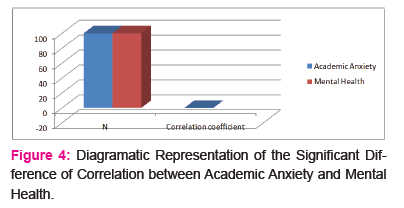
Figure 4 shows the scores of coefficient of Pearson’s Product Moment Correlation of Academic Anxiety and Mental Health of Adolescent Boys and Girls. And it can be interpreted that Academic Anxiety and Mental Health are negatively correlated.
RESULT OF THE STUDY
On the basis of statistical analysis of data, the study revealed the following finding:
1. There is significant difference between mean scores of Adolescent Boys and Girls of secondary schools on Academic Anxiety at 0.05 levels of significance.
2. There is significant difference between mean scores of Adolescent Boys and Girls of secondary schools on Mental Health at 0.05 levels of significance.
3. There is significant relationship between Academic Anxiety and Mental Health of Adolescent Boys and Girls of secondary schools at 0.01 and 0.05 levels of significance. But they are negatively correlated.
DISCUSSION
In this research paper, the relation of Academic Anxiety and Mental Health of Adolescent students was studied and the findings of first objective indicated that girls show more academic anxiety than boys. The finding of second objective of this study revealed that boys have better results in mental health in comparison to adolescent girls. And the third objective's finding showed that Mental Health and Academic Anxiety are correlated but they correlated negatively, it means that if the scores of mental health increases then academic anxiety scores decreases and if the scores of mental health decreases then academic anxiety scores increases.
CONCLUSION
The results of this study indicated that girls show more academic anxiety than boys and boys have better results in mental health. Another findings show that Mental Health and Academic Anxiety are negatively correlated. Therefore, it is important for teachers and parents to focus on Mental Health of the students and find out the ways to reduce their Academic Anxiety.
- The concept of Academic Anxiety will help the teachers to identify the students who are suffering from academic anxiety.
- Provide help to the students in reducing their anxiety level.
- Teachers should provide empathetic behaviour to the students so that the students can easily express their anxiety level to their teachers easily and they get sound mental health.
- This information helps the teachers to identify such students and help them to develop their trust towards teachers and parents.
- Responsibility of Parents to provide better home environment for their children so that their anxiety level can be reduced.
- Parents should not expect so much from their children so that they don’t get anxious and their mental health improved.
- It is concluded that academic anxiety affects the mental health of adolescents and if not taken care of properly, may result in disorder. So, teachers and parents should bestow the quality time to adolescents to gain a better mental health.
References:
[1] Aarwal, R. and Sarna, R.P. (2009). Studied the Gender Differences in Associated with Mental Health of the College going Students of various Faculties. Behavioural Scientist, 10(2); 119-126.
[2] Agashe, C.D. (1991). A psycho-social study of the Mental Health of players and non-players Ph.D., Phy Edu., Ravishankar University. In Fifth Survey of Educational Research (1988-92). New Delhi, N.C.E.R.T.
[3] Bartwal, R.S. (2014). To Study The Mental Health Of Senior Secondary Students In Relation To Their Social Intelligence IOSR Journal Of Humanities And Social Science (IOSR-JHSS) Volume 19(2). PP 06-10 e-ISSN: 2279-0837, p-ISSN: 2279-0845.
[4] Das, S.K., Halder, U.K., and Mishra, B. (2014). A study on academic anxiety and academic achievement on secondary level school students. Indian Streams Research Journal, Vol. IV, Issue. VI.
[5] Dholakiya and Jansari. (2005). A study of mental health of the students residing in affected and non-affected earth quake area and gender. Gujarat Journal of Psychology, Vol.No.15.
[6] Dube and Bhatnagar. (2006). Mental health of adolescents with specific reference to “Integration of personality” (IP), Gujarat Journal of Psychology, Vol.No.18.
[7] Gupta, G. and Kumar, S. (2010). Mental Health in Relation to Emotional Intelligence and self-Efficacy among College Students. Journal of the Indian Academy of Applied Psychology, Vol. 36(1), Pp. 61-67.
[8] Kumari, Neelam (2013). Academic anxiety and achievement of secondary school students -a study on gender differences, International Journal of Behavioral Social and Movement Sciences, Vol.02, Issue 01.
[9] Mohanty, S. (1992). The Occupational Stress and Mental Health in executives: a Comparative study of the public and private Sectors. Ph.D., Psy., Utkal University. In Fifth Survey of Educational Research. (1988-92). New Delhi, N.C.E.R.T.
[10] Ojha and Rani. (2004). A comparative study of the level of life stress and various dimensions of mental health among working and non-working Indian women, Journal of Community Guidance and Research, Vol.21 No.3
[11] Sharma and Pandey (2017) Anxiety, Depression, and Stress in Relation to Academic Achievement among Higher Secondary School Students The International Journal of Indian Psychology ISSN 2348-5396 (e) | ISSN: 2349-3429 (p) Volume 4, Issue 2, No. 87, DIP: 18.01.051/20170402 ISBN: 978-1-365-71287-6
[12] Sharma and Sarin (2016) The relationship among Academic Stress, Anxiety, Remedial Measures Adopted and Its Satisfaction among Medical Students: A Systematic Review. International Journal of Health Sciences and Research
[13] Sibnath Deb, Esben Strodl, Jiandong Sun (2015)Academic Stress, Parental Pressure, Anxiety and Mental Health among Indian High School Students, International Journal of Psychology and Behavioral Sciences, Vol. 5 No. 1, 2015, pp. 26-34. doi: 10.5923/j.ijpbs.20150501.04.
|






 This work is licensed under a Creative Commons Attribution-NonCommercial 4.0 International License
This work is licensed under a Creative Commons Attribution-NonCommercial 4.0 International License